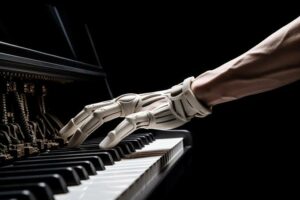As AI is becoming very popular due to its countless efficiencies. Scientist have tasted a Robo-Glove that help stroke patients to relearn piano. Researchers and scientists have combined innovative soft robotics with AI to design the new smart glove.
A robotic smart hand, an innovation of AI has given a new life to stroke survivors. Smart hand could help musicians who suffer stroke to regain their sense of confidence to play their instruments. A robotic glove is light weight, flexible and can be customised as per users requirement, and uses machine learning technology.
Dr Maohua Lin, an adjunct professor in the department of ocean and mechanical engineering at Florida Atlantic University states that,”“Here we show that our smart exoskeleton glove, with its integrated tactile sensors, soft actuators, and artificial intelligence, can effectively aid in the relearning of manual tasks after neurotrauma”.
According to the doctors and researchers, music is a therapy that help stroke patients to recover fast and boosts their motor functions. For the ones who love playing music and are musically trained,its understandable to them to know the important of playing the music again.
On the other hand, it is quite challenging to relearn the music and overcome from the trans they faced. Hence, retaining a skill that requires such high levels of dexterity and coordination is very challenging.
The main aim behind the creation of smart glove is to help stroke patients to overcome the anxiety and trauma they suffered from.The glove is light weighted and weighs only 191 grams. It is designed in a way that all the integrated components are placed through single molding process. The procedures makes it easy to produce through 3D printing.
The pneumatic actuators in each fingertip enables very fine movements as can be achieved through real hand. Whereas, 16 sensors offers tactile sensations, so the person using the hand really feels the actual sensation of surfaced and objects they are touching.
The objective would be for a patient to water smart gloves so that each hand can work independently to regain coordination and dexterity during the recovery.
“While wearing the glove, human users have control over the movement of each finger to a significant extent,” explained senior author Dr Erik Engeberg, a professor at Florida Atlantic University. “The glove is designed to assist and enhance their natural hand movements, allowing them to control the flexion and extension of their fingers. The glove supplies hand guidance, providing support and amplifying dexterity.”
To test the initial phase, the team worked together and programmed a glove with the series of movements necessary for it to move by itself to play basic themes on piano. There was another test conducted by researchers in which the glove was worn by a 25-year old volunteer.
It works on machine learning algorithms,the researchers successfully trained the globe to identify the difference between the correct and incorrect piano signs. Thai enables the gloves to provide feedback to a user helping them to improve their ability to learn with time.
According to Lin, “Adapting the present design to other rehabilitation tasks beyond playing music, for example object manipulation, would require customization to individual needs. This can be facilitated through 3D scanning technology or CT scans to ensure a personalized fit and functionality for each user.”
According to the research each year nearly 795,000 people gets stroke in U.S. Whereas, half of the survivors aged 65 and above faces a reduction in mobility, therefore, gloves provides a better solution to reduce the trauma they face.
There are still some challenges that are associated with the technology and still need to be overcome.But as per the researchers , “These findings highlight the potential of the smart exoskeleton to aid disabled individuals in relearning dexterous tasks like playing musical instruments.”
Read more:
ChatGPT Successors: AI Lawyers, AI-Driven Science, Humanoid Robots
Robots Learn New Skills By Watching YouTube
The post Robotic Gloves That Help Stroke Patients To Relearn Piano appeared first on TechJuice.
from TechJuice https://ift.tt/Ohy1VKm





0 Comments